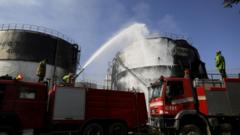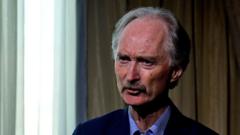Recent developments have highlighted the precarious situation of the U.N. peacekeeping force in southern Lebanon, known as UNIFIL, as it faces mounting pressure from Israel while continuing its mission amid dangerous conditions.
# UNIFIL Peacekeepers Remain Despite Israeli Threats and Attacks

# UNIFIL Peacekeepers Remain Despite Israeli Threats and Attacks
U.N. peacekeeping forces in Lebanon face attacks but maintain their positions amidst Israeli demands for withdrawal.
The U.N. peacekeeping mission in Lebanon, UNIFIL, announced its decision to remain in place despite an escalation of attacks from Israeli military forces. UNIFIL spokesperson Andrea Tenenti confirmed the force's commitment to its mission, citing evidence of targeted assaults that jeopardize the safety of its troops. He lamented that both the Israeli military and Hezbollah have posed threats to peacekeepers, with rockets being launched near peacekeeping positions.
Israel's frustration centers on the belief that UNIFIL provides cover for Hezbollah operations, prompting demands for the troops to withdraw. However, countries contributing to UNIFIL and the U.N. Security Council stood unanimously in support of the mission's continuity. Tenenti emphasized that UNIFIL's role is vital during this period of heightened tension.
Despite the risks, Tenenti reported finding evidence suggesting the potential use of banned white phosphorus munitions near peacekeeper locations, further complicating the humanitarian situation in southern Lebanon. The use of white phosphorus poses severe dangers to civilians and is restricted under international law.
In recent incidents, Israeli forces allegedly conducted multiple direct attacks on UNIFIL positions, resulting in physical damage to observation towers and even injuries to peacekeepers. However, Israeli officials have refuted claims of deliberately targeting U.N. troops, countering that their operations are strategically focused on counteracting Hezbollah.
As the situation remains fluid, the U.N. peacekeeping forces continue to monitor the volatile border region, risking their safety to uphold their mandate in Lebanon and support humanitarian efforts for civilians caught in the crossfire. The international community watches closely, aware that the stability of the region hangs delicately in the balance.
Israel's frustration centers on the belief that UNIFIL provides cover for Hezbollah operations, prompting demands for the troops to withdraw. However, countries contributing to UNIFIL and the U.N. Security Council stood unanimously in support of the mission's continuity. Tenenti emphasized that UNIFIL's role is vital during this period of heightened tension.
Despite the risks, Tenenti reported finding evidence suggesting the potential use of banned white phosphorus munitions near peacekeeper locations, further complicating the humanitarian situation in southern Lebanon. The use of white phosphorus poses severe dangers to civilians and is restricted under international law.
In recent incidents, Israeli forces allegedly conducted multiple direct attacks on UNIFIL positions, resulting in physical damage to observation towers and even injuries to peacekeepers. However, Israeli officials have refuted claims of deliberately targeting U.N. troops, countering that their operations are strategically focused on counteracting Hezbollah.
As the situation remains fluid, the U.N. peacekeeping forces continue to monitor the volatile border region, risking their safety to uphold their mandate in Lebanon and support humanitarian efforts for civilians caught in the crossfire. The international community watches closely, aware that the stability of the region hangs delicately in the balance.


















